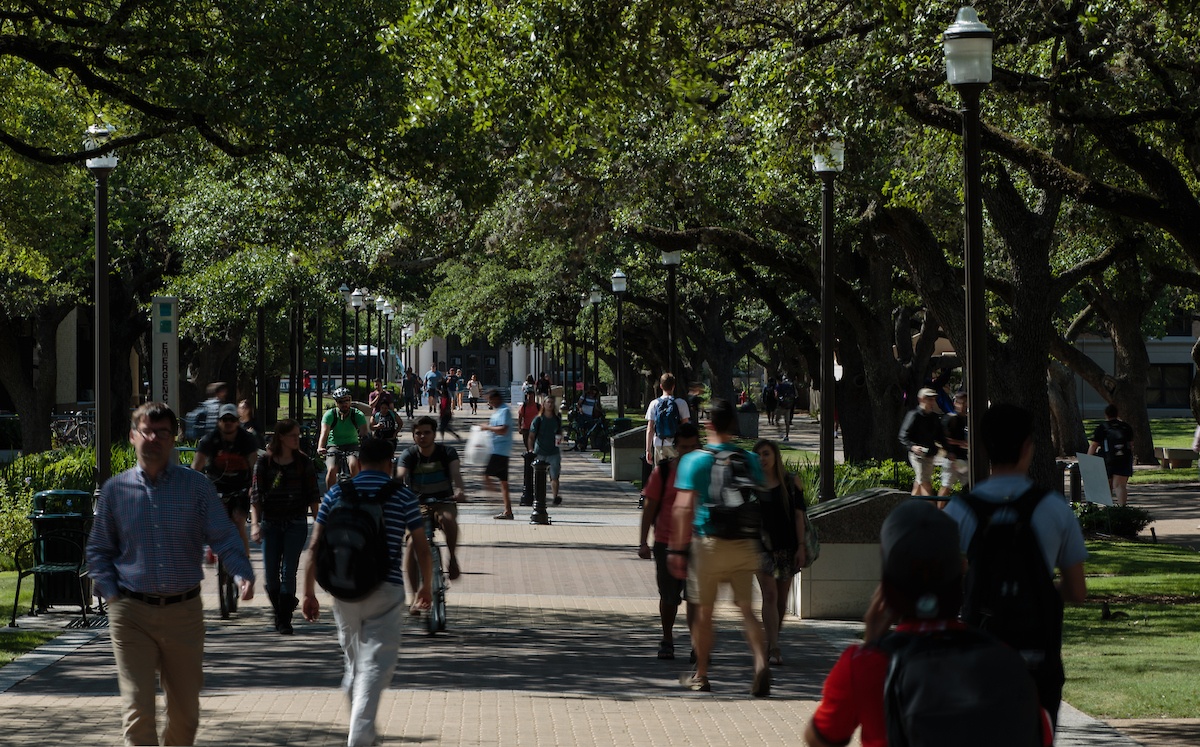
Texas A&M University students interested in learning more about science and how it affects their daily lives will have a unique opportunity this fall courtesy of a new course in the College of Science.
The new course is titled Contemporary Issues in Science: Cosmos, Earth & Humanity (SCEN101), the first offering within a two-semester Contemporary Issues in Science series. The aim of the course is to probe questions relating to a host of newsworthy topics and current events, from vaccine efficacy and safety to the role of energy, agriculture and plastics in climate change.
Specifically designed for non-science majors and requiring no prerequisites, the course is intended to be engaging to a broad audience. Organizers describe the class as a general survey science course that will cover subjects such as the Big Bang, evolution, genetics, vaccines, virology and epidemiological models of pathogen spread.
And due to its interdisciplinary nature, the class will feature multiple instructors from departments within both the College of Science and the College of Liberal Arts, giving students a rare opportunity to learn concepts from experts across broad fields of science.
“The goal of SCEN101 is to expose students to evidence-based knowledge about the physical world and teach them to think critically when presented with new information,” said Tamara Powers, senior lecturer of chemistry and course co-organizer.
“Topics will be presented by looking at accepted facts and theories, describing the scientific basis for those facts and theories, and discussing common misconceptions using a variety of sources, including news and online media. Misleading information will be cross-referenced with scientific analyses and peer-reviewed research, leading to discussions on how to evaluate the quality of scientific claims. By taking this course, students will be better equipped with the skills necessary to critically analyze science presented in the news, on TV and via social media.”
Rather than memorizing basic facts or equations, Powers says students will be presented with the evidence that supports well-established theories and taught how to critically analyze science as it is conveyed in traditional and social media realms. Organizers hope the course improves critical thinking skills and gives students a new appreciation for science.
“Given the course’s potential to spark curiosity, we hope the lessons conveyed, in combination with the overall experience, will excite students about STEM in ways that might lead them to pursue a more in-depth understanding of specific topics,” Powers said.
As one of the university’s primary service teaching colleges along with Liberal Arts, the College of Science provides the mathematics, statistics and natural science foundations for all Texas A&M majors. It teaches more than 280,000 semester credit hours during an academic year, including 190,000 in introductory courses.
About 80 percent of the college’s teaching mission is dedicated to educating undergraduate students who are seeking degrees in other colleges.
“Considering the fact that virtually every Texas A&M student will take a class in the College of Science at some point during their collegiate careers, our academic programs offer huge leverage for transformational education for all Texas A&M students,” said Dean of Science Valen E. Johnson, distinguished professor of statistics and course co-organizer.
“In many cases, our classrooms will be their last formal encounter with these subjects,” Johnson said. “Therefore, it’s vitally important that we encourage lifelong learning and appreciation for science by educating citizen scientists with critical thinking skills and the confidence to apply them, regardless of what fields they eventually choose to pursue.”
Longtime Texas A&M chemist Simon W. North believes faculty have as much to gain as students do from the CISC series, which he notes is as intentional in its non-traditional restraint as it is radical in its interdisciplinary scope.
“As scientists, most of us can say that we have a general idea of the topics in this survey, but not a single one of us could successfully teach this course alone with authority,” North said. “Because it is impossible in this day and age to be an expert in all things, this course is as much for the faculty as it is for the students. For the students, the course will help them grow into informed world citizens. For the faculty, the course could can encourage creative new research questions.”
Due to the ongoing COVID-19 pandemic, the course will be taught remotely in fall 2020. Students interested in registering for it are encouraged to contact their respective academic advisor for any necessary assistance.
For additional information about Contemporary Issues in Science: Cosmos, Earth & Humanity (SCEN101) or the two-semester Contemporary Issues in Science series, visit the course website.le
"course" - Google News
June 25, 2020 at 03:27AM
https://ift.tt/31dN0OE
Texas A&M To Offer New Science Course On Real-World Issues - Texas A&M University Today
"course" - Google News
https://ift.tt/35q9ps5
https://ift.tt/35rCFi1
Bagikan Berita Ini














0 Response to "Texas A&M To Offer New Science Course On Real-World Issues - Texas A&M University Today"
Post a Comment